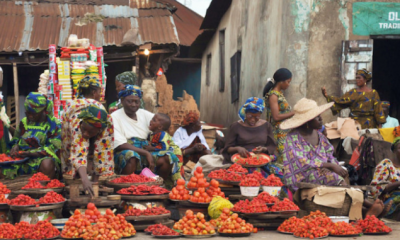By Milcah Tanimu
The recent surge in food prices across Nigeria has left many households struggling to manage their daily expenses. According to the latest inflation report by the National Bureau of Statistics (NBS), food items such as tomatoes, beans, and garri have seen price increases exceeding 200% over the past year. This drastic rise has pushed many families into hardship, making it difficult for them to afford basic meals.
*Adaptation Strategies*
In response to the soaring costs, many Nigerians are turning to alternative food sources. With fresh tomatoes becoming prohibitively expensive, some households are substituting with tomato paste and palm fruits. Others are using mushrooms as a meat replacement and opting for cheaper food options such as cocoyam or spaghetti instead of more traditional staples like yam and bread.
Mrs. Kehinde Salami, a retired civil servant, described how the increase in food prices has affected her family’s diet, stating that she now uses sachet tomatoes and dry habanero pepper in place of fresh tomatoes and peppers. Similarly, Mrs. Dorin Fehintola, a PoS agent, has reduced her family’s consumption of beans and replaced expensive tomato sauces with cheaper alternatives like vegetable leaf sauce.
Impact on Daily Life
The sharp rise in food prices has made it increasingly challenging for many to maintain their previous eating habits. Mrs. Nkem Chukwujekwu, a businesswoman, noted that even local options like palm fruit stew have become too costly. Meanwhile, Mrs. Ngozi Egwuagha, a grandmother, highlighted that common staples such as beans and garri have turned into luxury items, with the cost of a derica of honey beans now exceeding N2000.
*Market Reactions*
Sellers in various markets have also expressed frustration with the current situation. High transportation costs and fuel prices have compounded the issue, leading to poor sales despite having ample stock. Alh. Shehu Usman, Chairman of Mile 12 International Perishable Market, pointed out that insecurity in the North has displaced many farmers, disrupting food supply and contributing to the rising prices.
*Government Response*
The Nigerian government is actively working to address the food crisis. Measures include suspending import duties and taxes on essential food items and exploring new farming techniques to boost production. Dr. Aliyu Abdullahi, Minister of State for Agriculture and Food Security, emphasized the government’s commitment to ensuring food availability and improving agricultural practices to stabilize prices.
As Nigerian households continue to cope with the effects of inflation, the government’s efforts to enhance food security and address the underlying issues of transportation and insecurity will be crucial in alleviating the crisis. The current challenges underscore the urgent need for comprehensive solutions to ensure that all Nigerians can access affordable and nutritious food.

